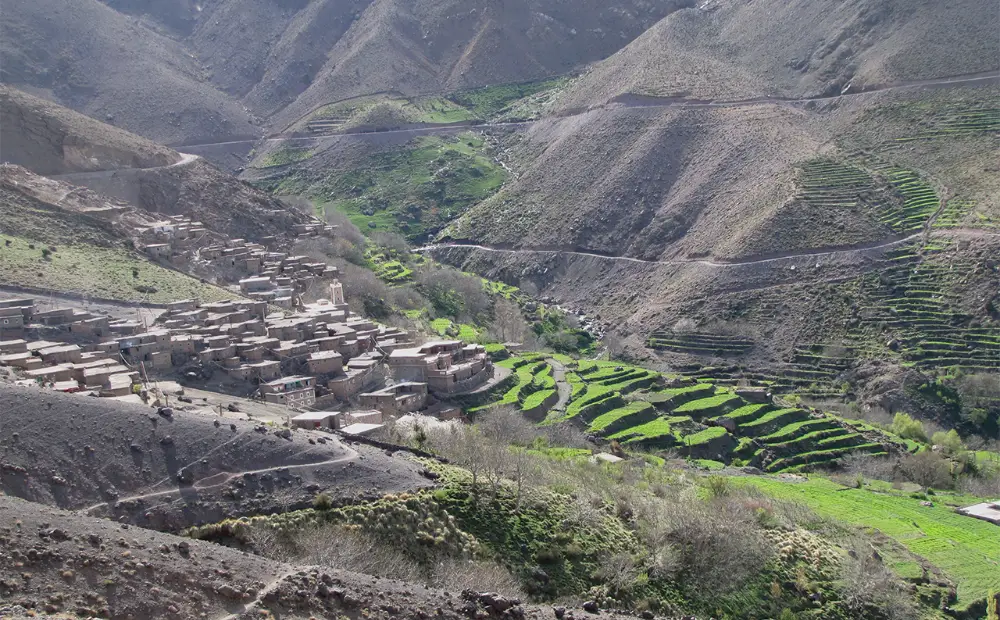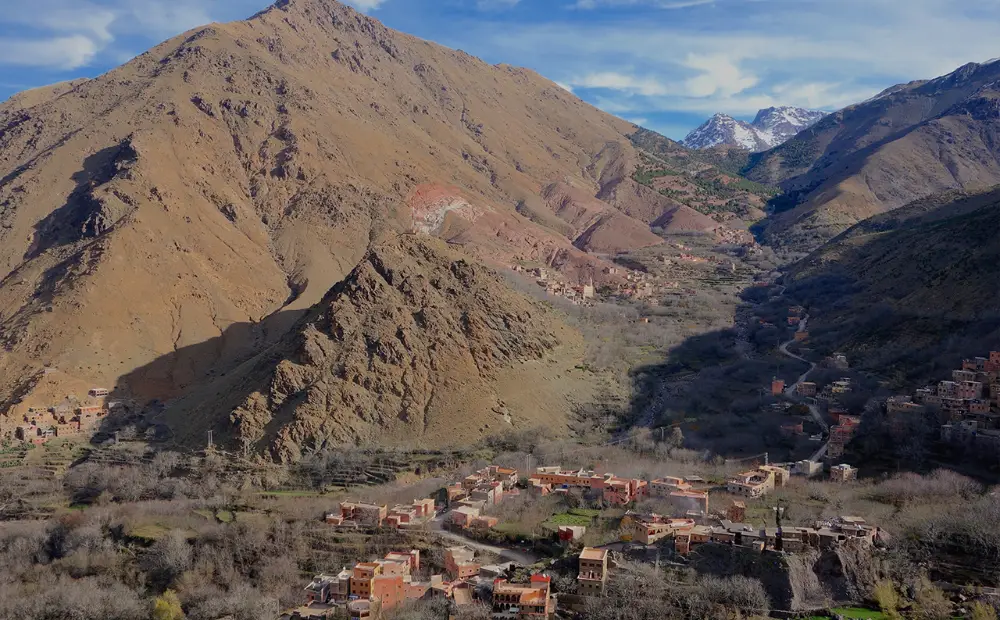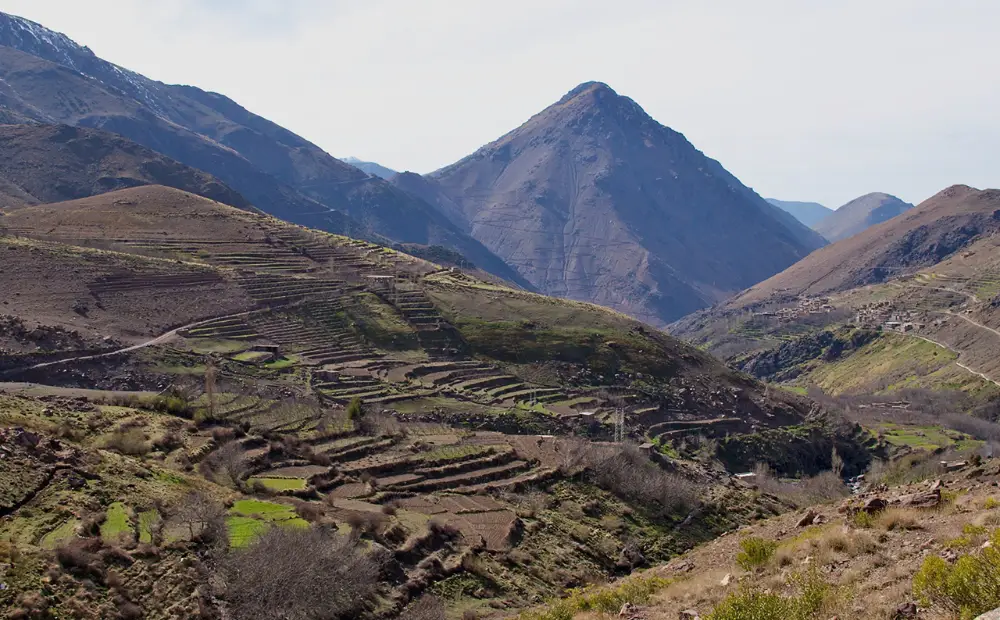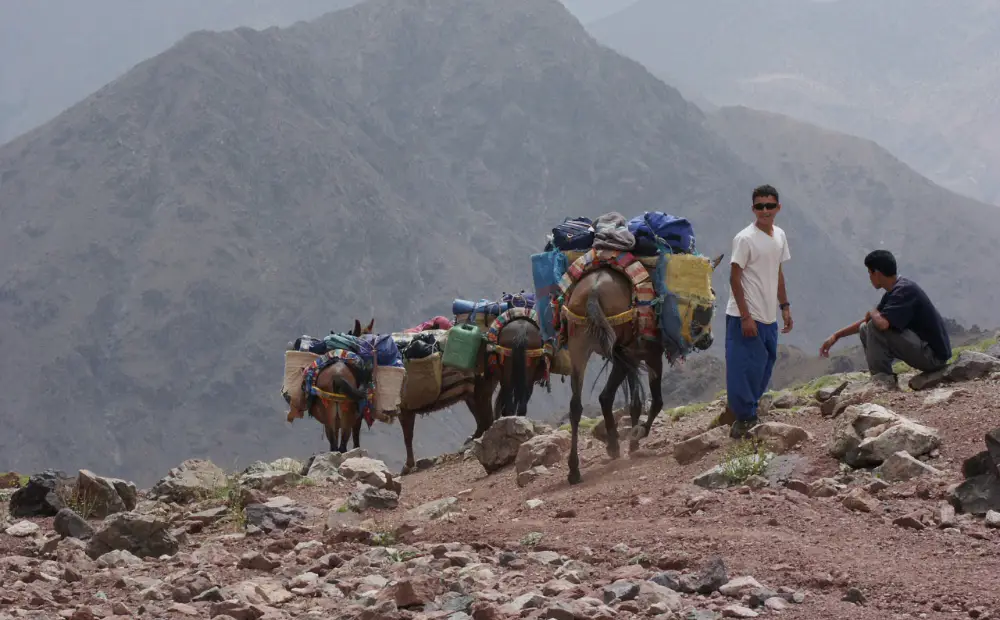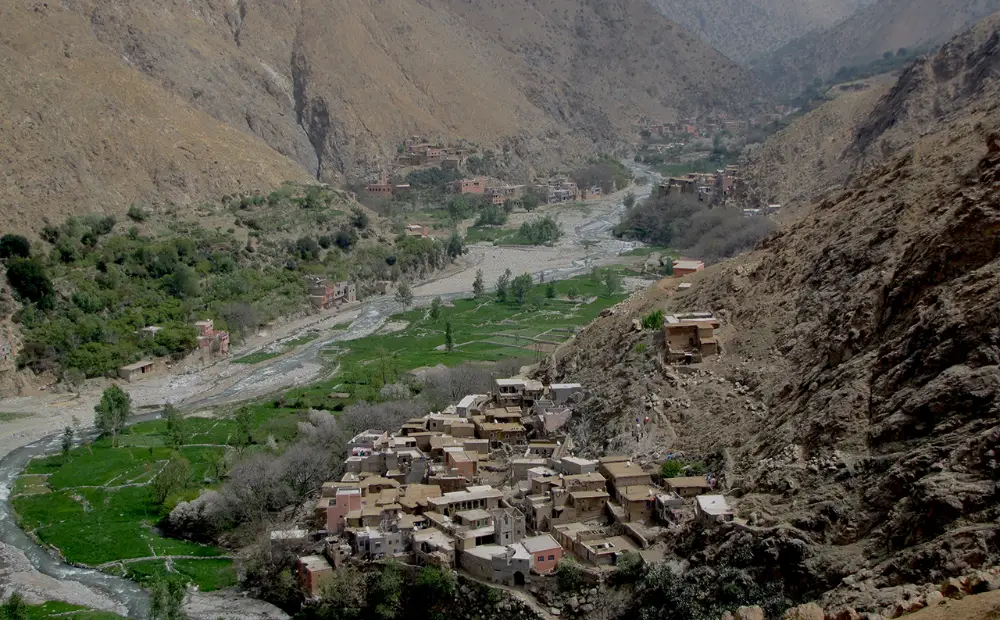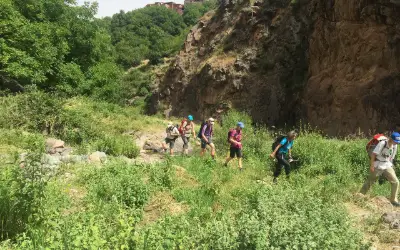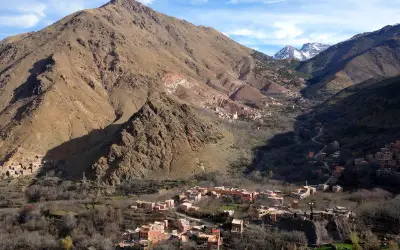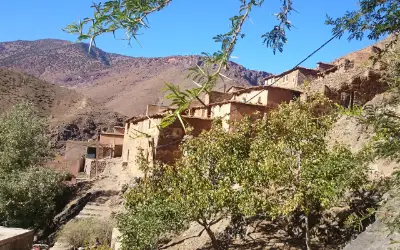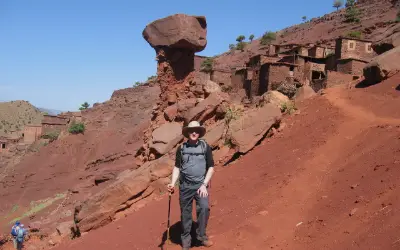
3 Days Imlil to Ourika valley guide trek from Marrakech
Tour snapshot
3 Days
Atlas Mountains - Morocco
185 € / per person
Learn more
Overview
3 Day Trek From Imlil To Ourika Valley Setti Fadma
This unforgettable guided 3-day tour starts and finishes in the vibrant city of Marrakech, and includes a 3-day trek from Imlil in the High Atlas Mountains to Setti Fadma in the beautiful Ourika Valley. This easy to medium 29km trek includes high windswept passes, wild and rocky landscapes, and a long descent into the upper Ourika Valley, a heavily cultivated area where countless green terraces and shady walnut groves cascade down the steep mountainsides. We travel to and from Marrakech by 4×4 or minibus.
What's Included
Group Pricing
| Participants Number | Price |
|---|---|
| 2 people peopel | 230 € / per person |
| 3 to 6 people peopel | 210 € / per person |
| 7 to 13 people peopel | 185 € / per person |
Booking Form
From EU 185€ / Per personItinerary
After being picked up from your accommodation in Marrakech at around 8:30 am, you will be transferred to Mouly Brahim Gorges onto the Berber town of Imlil (1750m). Imlil is situated in the upper foothills of the Western High Atlas Mountains, a natural paradise where trails set out in all direction. Here, we leave our vehicle. Meet up with Mount Toubkal team guide and muleteer for Berber tea before we start our trek up, winding mule tracks to Tizi N’Tamatert pass (2279m) to enjoy the amazing panorama of the surrounding Atlas Mountain ranges. You will have your picnic lunch on the Tamatert pass, overlooking Jebel Oukaimeden (3205m) and the beautiful encircled plateau. After lunch, you will set off following the path to the traditional Berber village before we arrive at one called Tachedirt, where we will spend the night. We will stay in a Berber guesthouse will be simple and basic but has beds with foam mattresses. The food will be cooked by the Mount Toubkal Expedition cook who is traveling with you. 4 hours walking
After helping to load our mules and a good breakfast, we start our trek to the terraced village of Timichi (1850m), and walk uphill to Tizi N’Tachedirt (3200m), where a stunning panoramic view of jebel Aksoul (3840m) affords, on one side and Bou Igenoune Mountain (3890m). On the other side. Stretching out, way below, is the beginning of the beautiful, verdant Ourika Valley. From here traverse the pass and continue down through the rocks for a further 2H30 walk until you reach the Berber village of Iaabassen (2040m) the surrounding mountains. We stop for our picnic lunch at the Berber village of Iaabassen (2030m) and then continue our trek down to the oldest village of Timichi, where we will spend the night. We will stay in a Berber guesthouse will be simple and basic but has beds with foam mattresses. The food will be cooked by the Mount Toubkal Expedition cook who is traveling with you. 7 hours walk.
After breakfast, set out for a 4 to 5 hours walking eastwards down along the valley, full of cornfields and walnuts groves, passing through the villages of Isghouarne and Tiourdiw and Agadir N’ait boulmane to arrive at the end of the beautiful Ourika valley proper and the renowned Berber village of Sitti fatma. Here, amongst the ancient nut trees and waterfalls just outside of the village, your cook will stop to prepare your lunch, before hiking on for a further half an hour to rejoin your transport to take you back to Marrakech city. 5 hours walk, 1H30 drive.
Additional Informations
About The Trek
Mount Toubkal – Essential Info
At Mount Toubkal, the World we believe in provide our clients with the best services and key to the enjoyment of any holiday in our opinion, it is the balanced and up-to-date information offered by the tour operator. We are confident that the items detailed below when taken in conjunction with a reputable and reliable guidebook will enhance your Trekking experience as well as ensuring you receive the very best service from Mount Toubkal, the World in the Atlas Mountains of Morocco.
M-T : STAFF
It is important that our staff in our Mount Toubkal office have experienced the wonder of High Atlas Mountains Trekking and are able to answer many of your important questions.
Mohamed, for example, has trekked in the Toubkal and Berber regions and visited many of the places included on our hiking itineraries has also made it to the top of Jebel Toubkal – many of the photos on our website were taken by him and his traveling companions on his various trips to the region.
M-T : GUIDES
All Mount Toubkal guides are fully licensed and are experienced from an early age in the Atlas Mountains areas, and guiding continues to be the heart and soul of who we are. We require that all of our guides undergo extensive safety training before officially joining us a mountain guide /or winter guide, local knowledge and guiding abilities. We believe that a local, licensed guide will offer more insight into the High Atlas region and Berber people as well as enhancing the local economy.
As well as a tip (see below) if you have had a great experience with your guide, you may wish to offer him something of yours that will assist his duties.
Please be guided by your guide’s expert advice on difficult or exposed paths and please respect the prayers of your guide and muleteers – they will usually do this outside of walking times so as not to interrupt your hiking.
M-T : MULETEERS & MULES & LUGGAGE
Your team of muleteers, along with mules, will vary in number depending upon the size of your group and whether you are camping or staying in guesthouse/refuge but they will all perform the same function which is to provide a full back up service for your hike, cook and prepare meals and set up the evening camp.
The mule team will load up your luggage, food and, if relevant, the camping equipment at the start of each day but will not always walk either at the same time, pace or route as your hiking party. So, it is important that you consider which items you may require to carry yourself in the morning and then again in the afternoon as on some days you may only meet up at lunch-time.
The mules are completely used to carrying the loads and it is not unusual for them to carry in excess of 80 kgs each which is equally balanced in two baskets. The muleteers take great care in both hygiene and presentation of your food and perform wonders with such limited conditions.
We recommend you take your trekking luggage in a large holdall or rucksack which can perhaps be folded up inside your main luggage if you are also traveling around the Atlas Mountains and wish to have the security of your usual suitcase(s). You should also take a suitable daypack which will carry drinking water, camera, hat, raincoat, etc. as you may not be in direct contact with your support team at all times during the day.
WEATHER
In winter, much of the region above 2500m can be snow-covered and hiking in these areas could require the use of crampons and ice axes. High winds and precipitation in whatever form may preclude some routes and this will be discussed before you set out or can be modified at any time with the advice of your guide.
RAMADAN
We will maintain our programme of trekking during the holy month of Ramadan but we would ask you to respect your team by allowing them the courtesy of eating an early breakfast (before sunrise) and to avoid, where possible, drinking, smoking and snacking immediately in front of them during the day – they will, of course, prepare the usual lunch though as part of their duties.
WATER
It is important to drink lots of water during your hike; water can be purchased in Marrakech before you set off or in Imlil. It is also possible to obtain water from small kiosks in many villages and from the trailhead of Tizi tamatert and at the Tizi Oussem. You will need to carry some of this by yourself but your mules will carry some more. Please, discuss with your guide the water requirements on a regular basis.
MEALS
Breakfast – tea, coffee, juice, fruit, milk, bread, butter, jam, cheese, porridge,
Picnic lunch – fresh Moroccan salad, cheese, sliced sausage, tinned tuna fish and sardines, bread, fruit, mint tea (pasta, beans, potatoes, and rice can also be included).
Dinner – Soup, Tajine (chicken or mutton with vegetables), spaghetti, couscous (main courses rotate depending on the duration of trek .You are also more likely to get couscous on a Friday), bread, coffee, tea, cake, fruit.
* Vegetarians, vegans and those with special dietary requirements of any kind need to advise at time of reservation.
TIPS
Naturally, tipping is an entirely personal matter and a little goes a long way in Morocco; however, we are always asked for a little guidance. So, here is what we would consider as fair, amounts refer to your guide, a smaller amount can be given to your muleteer team:
1-3 days hiking –150 DHS per person total
4-7 days hiking – 200 DHS per person total
7 days + hiking – 250 DHS per person total
Of course, you can offer more if you wish; tips are usually held and then passed over during a handshake to avoid any embarrassment or undue attention to the matter.
GRADING OF HIKES
Whilst, we try to ensure that our descriptions are accurate for most people wishing to undertake hiking in the Atlas Mountains, clearly, there are many different factors that contribute to the difficulty of a particular hike.
These include the length of day, terrain, altitude and weather conditions. Since these factors are necessarily variable, any system of grades can only provide a general indication.
We have tried to make our system as clear as possible but it cannot account for personal abilities or experience.
ENVIRONMENT
It is vitally important that you respect the mountain environment; litter, in particular, is damaging the landscape and can injure animals. Please, please, please take all your litter home or drop it off at suitable points.
Mount Toubkal guiding teams are proud guardians of their natural heritage and will ensure that rubbish is collected and either taken out or burned where possible. In fact, our guiding teams have been known to take a few extra minutes to collect and burn the rubbish of groups that were not so environmentally sensitive. Some organic matter can be left as much of it will be eaten by the local goats.
Berber tea house
The Accommodation will be in a Berber guesthouse will be simple and basic but has beds with foam mattresses. The food will be cooked by the Mount Toubkal Expedition cook who is traveling with you.
CAMPING
Camping is an option if preferred (June-Octo).
We provide modern igloo-style tents that sleep two persons each; they are of various sizes so ideally, we would like to be advised in advance if any of your party is particularly tall (6 ft or over). So that, we can provide the most suitable tents for all groups.
Along with the sleeping tents, we also provide one or more large traditional Berber tents for cooking, eating and socializing which make your camp a little bit special.
NB: If accommodation is required in the Atlas Mountains either before or after the trek, we can always book you at our Imlil Refuge or at our Riad Dar Bab Toubkal in Armed village.
Clothing and Equipment
You should dress according to altitude and the environment you will be located in. Most treks are in high altitude climates in remote areas. Therefore, there are often large temperature swings. Temperatures are often colder at high altitudes.
Clothing for Trekking
Trekking boots or lightweight walking shoes. Having comfortable footwear is essential for a good trek. Make sure all footwear is broken in well prior to your trek. Do not break in boots on your trek,
A tracksuit and a pair of track shoes to wear in the Berber tea house and camp at night,
Two pairs of woolen socks for trekking shoes and track shoes,
Warm down jacket and rainproof jacket with hood for protection from rain,
Woolen hat for the cold and sun hat or cap for sunny days
A pair of woolen gloves and a pair sandals to wear in Berber tea houses or camp,
Two cotton T-shirts and two pairs of long shorts/skirts
Woolen shirts and thick sweaters as well as wind and waterproof trousers,
Pair of light or heavyweight trouser and one lightweight long sleeve shirt,
Two pairs of thermal undergarments,
Equipments for Trekking
Trekking or duffle bag to carry trekking gear. Mount Toubkal can provide a duffle bag for you to borrow during your trek. This will be returned after your trek,
Trekking daypack for personal items such as water, snacks, extra layers and camera,
Water purification tablet and bottles,
Sleeping bag,
Travel Pillow,
sunglasses,
Sunblock,
Lip balm with sunblock in it,
handkerchief or wiping papers,
Money belt,
First-aid kit,
Trekking equipments are available at Imlil Center. Mount-Toubkal can recommend shops for you to purchase equipment. If you do not wish to buy equipment, you can easily hire or rent them for the duration of your trek with reasonable prices.
Similar Experiences



